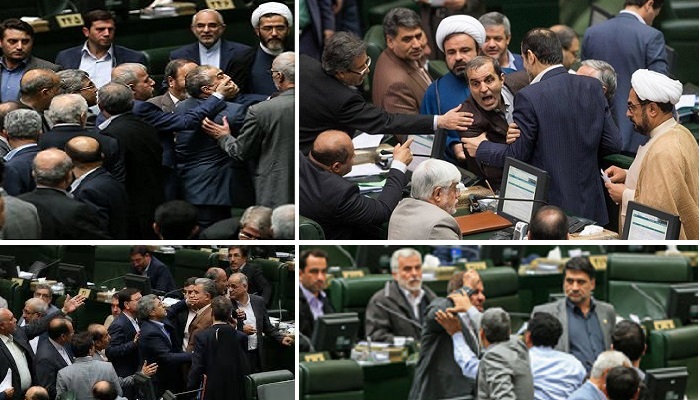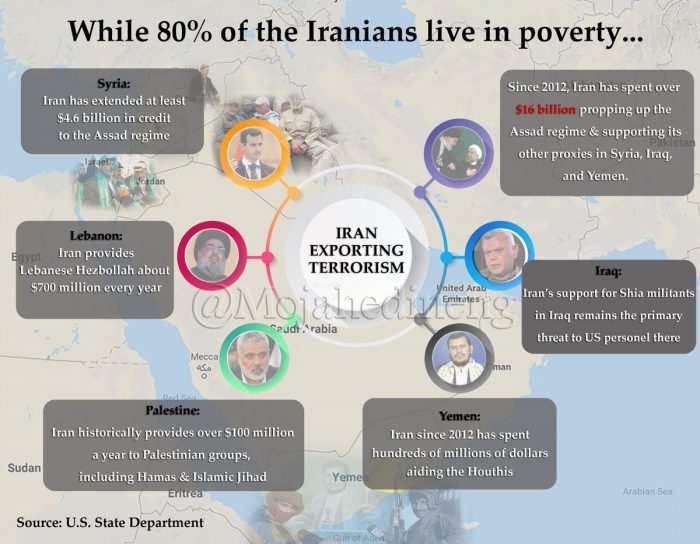
Infighting among regime parliamentarians a reflection of the insolvable internal crisis within the regime.
On Sunday, the Iranian Majlis (parliament) held a public session which devolved into factional infighting as regime leaders attempted to pass the blame for the country’s escalating economic crisis.
Hardliners from Supreme Leader Ali Khamenei’s faction blame regime President Hassan Rouhani and his government for the country’s economic woes. Members of Rouhani’s “moderate” faction have attempted to push back on this narrative, arguing that blaming the regime empowers the MEK and the Iranian Resistance.
Ignore the Problem
Mohammad Kazemi, a so-called moderate Majlis member made this argument at Sunday’s session, saying:
“We should fear a tomorrow where, due to incompetence and bad timing, the people are disillusioned about the impact of committed movements and personalities, and pro-regime change activists will take the lead in the country’s politics.”.

The bankrupt and corrupt Iranian regime economy.
Blame the Elites
Majlis member Sakineh Almasi was quick to point the blame for Iran’s economic disaster on the country’s elite. She cited several examples of corruption by the elite in Asaluyeh, southern Iran, where a large portion of Iran’s oil and gas industry is concentrated.
“Asaluyeh is like a dairy cow and the petrochemicals being the wallet of the elite. Innocent locals in Asaluyeh die because of chemicals so that the elite can have economic rent in figures reaching hundreds of trillions of rials [billions of dollars]. Such money at times ends up in the U.S. and Canada,” she confessed, revealing the extent of corruption within the regime’s ranks.
Almasi said that 450 workers at the South Pars gas fields have not received their wages for several months, blaming the economic elite for the delays and subsequent protests.
“In the current economic circumstances, it has been months since they are in this limbo, there is no way to pay them and their insurances haven’t also been paid. Their daily protest rallies in Asaluyeh have been repeatedly exploited by the opposition media outlets,” she added.
Workers from many sectors of Iranian society have protested over delayed or unpaid wages over the past year. Teachers, municipal employees, and pensioners have all waited months for their paychecks because of the crumbling economy and the regime’s substandard labor practices.
#MEK–#Iran: Twelve Protests Reported in One Day in Various Cities Across Iran https://t.co/9ObGAyU5FX #IranProtests #MEK #FreeIran @USAdarFarsi
— MEK Iran (Mujahedin-e Khalq) (@MEK_Iran) May 23, 2019
State the Obvious
Majlis member Gholiallah Gholizadeh stated the obvious: “The people can’t bear any more relentless economic pressures.” He failed to offer a solution.
Blame Rouhani
Hardliners from Khamenei’s party placed the blame for the country’s economic issues squarely at the feet of Rouhani.
“[Rouhani] has delegated responsibilities to unqualified and lazy sybarites who worship their sons-in-law, children, relatives, and acquaintances. And money,” he said, faulting Rouhani’s incompetence for the “loss of opportunities.”
Unpaid Wages, Economic Crises, and Government Corruption Lead to New Protests in #Iran https://t.co/S1AC6FQyUH #IranProtests
— MEK Iran (Mujahedin-e Khalq) (@MEK_Iran) January 27, 2019
Hardliner Jabbar Kuchakinejad criticized Rouhani for bringing up the issue of constitutional authority.
“Instead of taking care of the people’s problems, Rouhani has raised the issue of his own authority,” he said. He raises the issue of a referendum and other mandates related to ministries so that we increase the government’s dimensions. This means, instead of taking care of the people’s fundamental needs, Rouhani has entered the sidelines.”
Resistance and Political Change Will Come from the Depths of Economic Despair https://t.co/20uReGZLLW #Iran #MEK #IranRegimeChange #FreeIran
— MEK Iran (Mujahedin-e Khalq) (@MEK_Iran) March 1, 2019
The economic catastrophe facing Iran has left 80% of its citizens living below the poverty level and forced many to sell their organs to meet basic needs or rummage through public trash cans to find food. The situation is not sustainable and continues to deteriorate.
Staff writer
